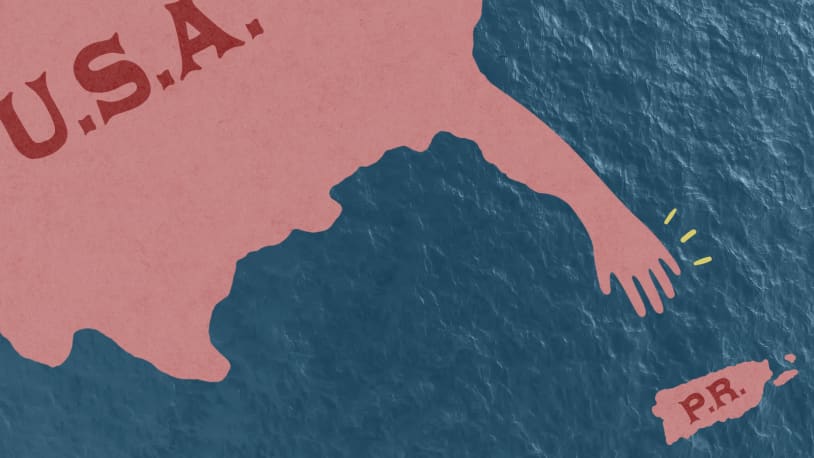
Puerto Rico’s status: Should it become a state?
The political status of Puerto Rico has been a contentious topic since the island became an unincorporated territory of the United States in 1901. Under its current status, Puerto Rico is a U.S. territory. While over 3 million Puerto Ricans are born U.S. citizens, those who reside on the island cannot vote in U.S. presidential elections. The island only has one representative in Congress, Republican Jenniffer González-Colón, a resident commissioner who can’t vote. The debate about political status divides the island’s residents and other diasporic Puerto Ricans. Their three-party government system is divided into supporters of total independence, advocates for statehood, and those who wish to remain a U.S. territory.
There have been 145 bills attempting to address the island’s political status debated in the U.S. Congress, according to Charles Venator-Santiago, director of the University of Connecticut’s Puerto Rican Studies Initiative. While several measures managed to pass the House, none have ever moved through the Senate and become law. Recently, the House advanced a bipartisan bill known as the Puerto Rico Status Act, under which island residents would decide whether Puerto Rico should become a U.S. state, an independent country, or an independent country aligned with the U.S. All but 16 GOP representatives voted against the bill. Next, it will move to the Senate, where it faces an uphill battle. Should Puerto Rico be granted the opportunity to become the nation’s 51st state?
Granting statehood is the only democratic option
A majority of Puerto Ricans voted “yes” to statehood in 2020, recalled Rep. Darren Soto (D-Fla.) and Del. Jennifer Gonzalez Colon (R-Puerto Rico) in a 2021 op-ed for The Hill. This is the most “simple and compelling” reason for granting statehood, argued the lawmakers, both of whom collaborated on the Puerto Rico Status Act. “Delaying admittance of Puerto Rico as a state to our union would be a direct contradiction of our nation’s democratic values.”
Plus, statehood would allow Puerto Rico to finally overcome many of its economic challenges, Soto and Gonzalez Colon said. The territory has struggled to cope with the damage from natural disasters like Hurricane Maria in 2017, earthquakes, and, most recently, Hurricane Fiona. Without congressional representation, the island has been forced to pressure the White House to gain access to more emergency funding. “Statehood offers a simple solution that would enable Puerto Rico to finally be on stable ground,” and “would offer paths to reform that could result in a more robust economy and a prospering people,” Soto and Gonzalez Colon wrote.
Independence would be better than statehood
“Independence, not statehood, is the path we must pursue,” wrote Jaquira Díaz for The Atlantic. America has failed Puerto Ricans, leaving them to fend for themselves after natural disasters and subjecting them to decades of injustices — including “population-control policies, starting in the 1930s, that promoted the mass sterilization of Puerto Rican women and used Puerto Ricans for medical experiments,” the Puerto Rican author of Ordinary Girls said. Statehood would simply extend the borders of the United States, allowing more Americans to move to Puerto Rico, therefore displacing Puerto Ricans in positions of power. “Self-determination for Puerto Ricans necessitates not just cutting them loose, but also restoring what has been taken and otherwise making amends,” Díaz said.
Puerto Ricans should at least be offered a real opportunity to choose
The Puerto Rico Status Act is an opportunity for the U.S. government to give Puerto Ricans “the chance to choose the political status they want with their vote,” Rep. Raul Grijalva (D-Ariz.), another lawmaker championing the bill, wrote for The Hill. Most people living on the island “agree that its territory status must end,” even if their opinions about its future political status differ. While the bill “doesn’t entirely satisfy the ideals of any one side of Puerto Rico’s political status debate,” what’s most important is that “it offers a real opportunity for a fair, transparent process to the island at last.”
Puerto Ricans have previously held referenda on statehood, most recently in 2020, but the results were never honored because they were non-binding. “Unlike past votes, this bill requires Congress to honor the vote and implement the political status chosen by the majority,” Grijalva wrote. “The voice of the people of Puerto Rico can no longer be ignored.”
The political status of Puerto Rico has been a contentious topic since the island became an unincorporated territory of the United States in 1901. Under its current status, Puerto Rico is a U.S. territory. While over 3 million Puerto Ricans are born U.S. citizens, those who reside on the island cannot vote in U.S. presidential elections.…
The political status of Puerto Rico has been a contentious topic since the island became an unincorporated territory of the United States in 1901. Under its current status, Puerto Rico is a U.S. territory. While over 3 million Puerto Ricans are born U.S. citizens, those who reside on the island cannot vote in U.S. presidential elections.…